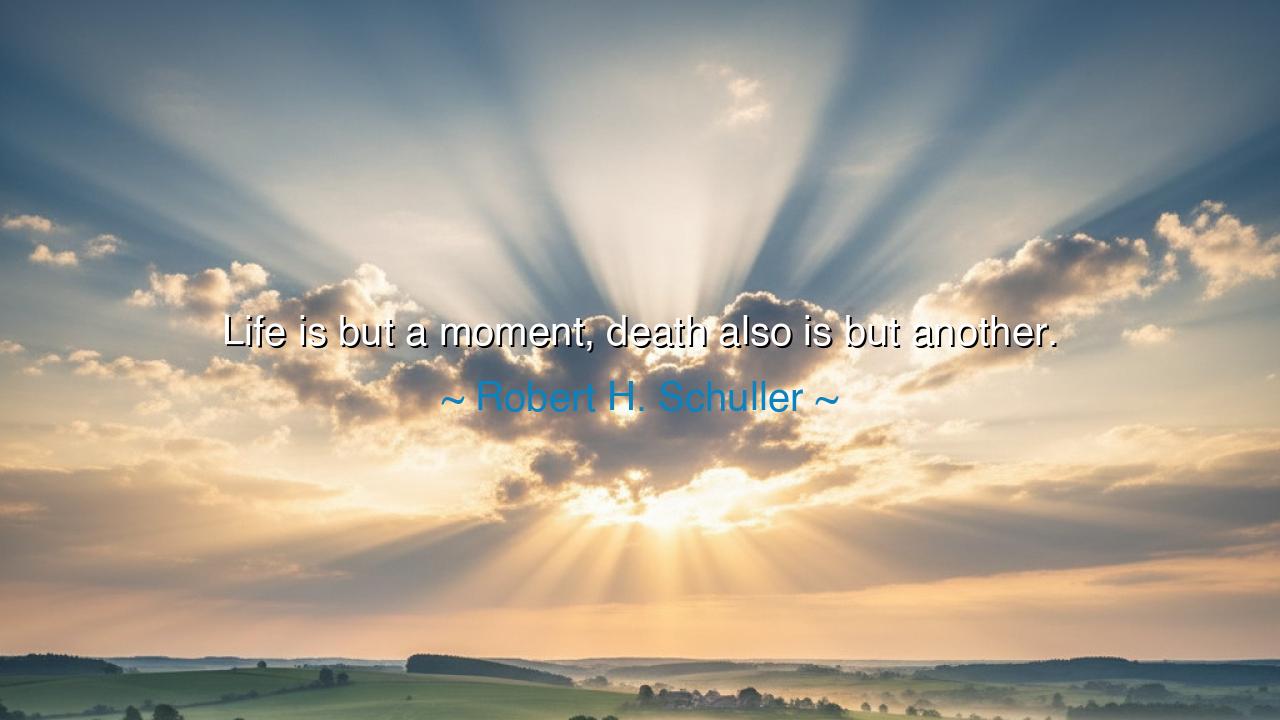
Life is but a moment, death also is but another.






In the councils of elders, where lamps burn low and voices grow steady, hear the brief thunder of Robert H. Schuller: “Life is but a moment, death also is but another.” In one clean stroke he balances the scales—two beats of the same cosmic drum, two doorways on the same corridor. The saying does not diminish living; it magnifies it. If life is a moment, then it is precious; if death is but another, then it is not a terror beyond telling but a passage already woven into the fabric of our days. Schuller, a preacher of possibility, sets our gaze not on length but on weight, not on counting hours but on consecrating them.
The meaning is stern and kind at once. To call life a moment is to command attention: be here, while here is given; harvest the hour before the field changes color. To call death another moment is to unmask it—not as an abyss that swallows meaning, but as the neighbor of every breath. Between these two moments stretch our choices: to forgive or to calcify, to build or to brood, to bless or to pass by. The ancients would say: if the day is short, let it be bright; if the night is sure, let the lamp be trimmed.
Schuller’s own vocation fits this cadence. Known for an ethic of hopeful, forward motion—the “possibility thinking” that marked his sermons and books—he taught millions to meet setbacks with practiced courage. His long ministry, from the farm-boy beginnings to the glass cathedral and the Hour of Power, kept returning to one insistent theme: life’s brevity is not a sentence of fear but a summons to purpose. Even his death in 2015 was remembered not as the eclipse of a message but as its seal: time is limited; hope is not.
To make it plain, hear a humbler story. A nurse in a small ward kept two baskets by her station. Into the first she placed notes from families: “He laughed today,” “She tasted peach,” “We sang the old hymn.” Into the second she placed the undone: “Call the son,” “Mend the quarrel,” “Write the letter.” Each evening she held the baskets side by side and said, “Two moments.” One held the radiance of lived hours; the other held the work that gives death its gentleness. Over time, the second basket emptied, not because death delayed, but because love hastened. The ward did not become less sorrowful, but it became more true.
History offers a sterner witness. Consider Pericles’ funeral oration, where a city honors its dead by changing the lives of the living—vowing to be worthy of those moments already sealed. The practice is older than any empire: we measure life by how we spend it, and we measure death by what it awakens in those who remain. A people who treat both as moments—weighty, finite, instructive—become artisans of meaning rather than accountants of fear.
What, then, is the rule for our feet? First, make a covenant with the present: each morning name one small, concrete act that would make today matter if it were your last ordinary day. Second, reconcile early: keep short accounts so the ledger closes clean. Third, practice legacy in motion: teach what you know now; give while your hand is warm; write the blessings you hope to leave and start delivering them. Fourth, order your affairs—papers, passwords, stories—so that your love remains useful when your voice grows quiet. These are not rehearsals for dying; they are rehearsals for truth.
Finally, carry the cadence like a pocket prayer: life—moment; death—another. Let it chasten procrastination and comfort dread. Let it turn you from hoarding days to hallowing them. For if both thresholds are moments, then the art is to pass through each with a steady heart: to greet the morning with attention, and the evening with trust. This is Schuller’s ancient-sounding wisdom in a modern tongue: live so that when the second moment comes, it finds you already generous, already awake, already at peace.






AAdministratorAdministrator
Welcome, honored guests. Please leave a comment, we will respond soon